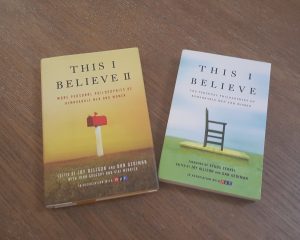
Sermon Text: Colossians 1:15-20
Sermon Excerpt
As a resident of Southwest Florida for the last several years, I have been blessed to expand my horizons in many ways – including learning from many of you about what everyday life was like before I was born. I understand many of you grew up in a time I call “BT” – Before Television. In the world before every home had a television and every television had the ability to receive dozens of channels, there was radio.
Perhaps you can remember gathering around the radio to listen to your favorite programs . . . I wonder if any of you ever remember listening to Edward R. Murrow’s program, “This I Believe” back in the 1950s.
This brief nightly feature presented “the personal philosophies of thoughtful men and women in all walks of life.” These five minute inspirational talks by famous people and people the audience had never heard of before were void of “pat answers for the problems of life.” Instead, they contained refreshingly real, amazingly authentic, and particularly personal accounts of what people believed and how their personal philosophies gave meaning to their lives.
More than 50 years after the original series, I was introduced to “This I Believe” when I was asked to write reviews of two books of essays bearing the same name. These books contained some of the original essays from the 1950s alongside contemporary statements of belief from the 2000s. The new essays were also originally aired on the radio via NPR.
Think about how short five minutes really is . . . now picture yourself trying to write an essay that tells the world what you believe. Don’t forget to consider the editing required to ensure your expression can be shared orally in five minutes or less.
For centuries the church has attempted to simplify this exercise. The two most commonly stated creeds in all of Christianity – the Apostles’ Creed and the Nicene Creed – can be read aloud in less than five minutes. While neither is likely a statement any of you have adopted as your personal life philosophy both contain elements of what has long been understood as the historic Christian faith.
In our midst, however, are many followers of the Way of Jesus who are not comfortable reciting either. While some elements from both creeds may resonate, for a number of people the language and theology does not. Since our tradition is not creedal, we . . . (read manuscript or watch video)
So What?
I have spent many years in congregations that recited creeds as a regular part of their corporate worship and many years in congregations that were proudly not creedal. Both options contain challenges.
For the creedal congregations the challenge is to understand and make meaning of the words for and in our 21st century context. The challenge for individuals is to decide what to believe from the approved doctrinal statements and in what way(s) and whether or not to say aloud creeds or sign off on statements of belief that conflict with their personal theologies.
For those congregations that do not adhere to or regularly recite creeds the challenge is to find ways to talk about what it is those who participate in a given community of faith hold in common when it comes to beliefs. The challenge for individuals is to clearly articulate personal statements of faith without the benefit of several familiar examples and to go beyond crafting such a statement to actually discussing it with others within their faith communities.
- Is your congregational creedal or not? What do you see as the greatest strength(s) and weakness(es) of this perspective?
- Have you ever written a statement of faith? If so, what was the experience like? Do you regularly review and update your statement?